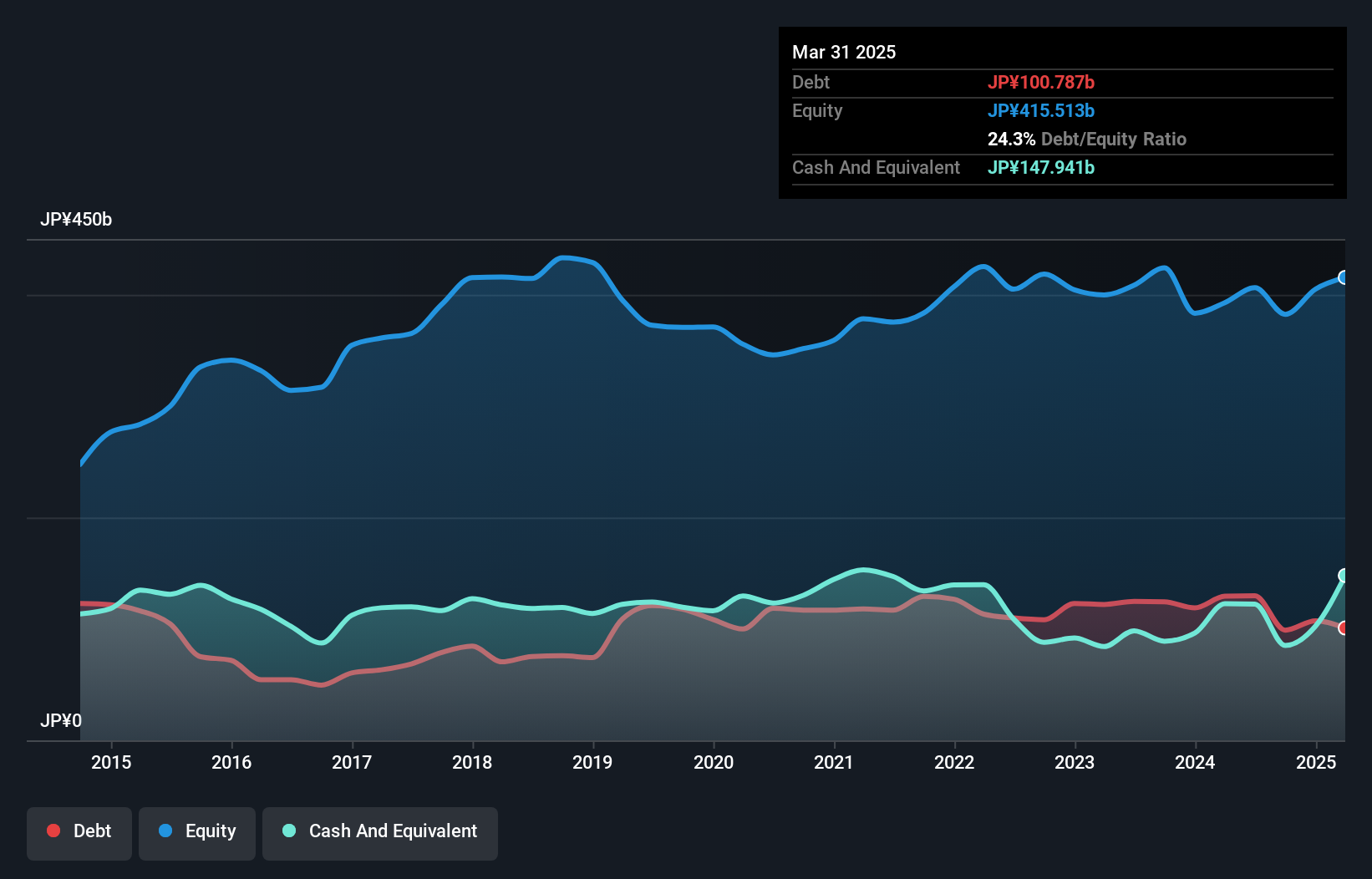- Japan
- /
- Electronic Equipment and Components
- /
- TSE:6770
These 4 Measures Indicate That Alps Alpine (TSE:6770) Is Using Debt Reasonably Well
Warren Buffett famously said, 'Volatility is far from synonymous with risk.' So it might be obvious that you need to consider debt, when you think about how risky any given stock is, because too much debt can sink a company. Importantly, Alps Alpine Co., Ltd. (TSE:6770) does carry debt. But is this debt a concern to shareholders?
Why Does Debt Bring Risk?
Debt and other liabilities become risky for a business when it cannot easily fulfill those obligations, either with free cash flow or by raising capital at an attractive price. In the worst case scenario, a company can go bankrupt if it cannot pay its creditors. While that is not too common, we often do see indebted companies permanently diluting shareholders because lenders force them to raise capital at a distressed price. By replacing dilution, though, debt can be an extremely good tool for businesses that need capital to invest in growth at high rates of return. When we think about a company's use of debt, we first look at cash and debt together.
How Much Debt Does Alps Alpine Carry?
The image below, which you can click on for greater detail, shows that Alps Alpine had debt of JP¥100.8b at the end of March 2025, a reduction from JP¥129.3b over a year. But it also has JP¥147.9b in cash to offset that, meaning it has JP¥47.2b net cash.

How Healthy Is Alps Alpine's Balance Sheet?
The latest balance sheet data shows that Alps Alpine had liabilities of JP¥226.9b due within a year, and liabilities of JP¥98.3b falling due after that. Offsetting this, it had JP¥147.9b in cash and JP¥164.9b in receivables that were due within 12 months. So its liabilities total JP¥12.3b more than the combination of its cash and short-term receivables.
Since publicly traded Alps Alpine shares are worth a total of JP¥303.2b, it seems unlikely that this level of liabilities would be a major threat. Having said that, it's clear that we should continue to monitor its balance sheet, lest it change for the worse. While it does have liabilities worth noting, Alps Alpine also has more cash than debt, so we're pretty confident it can manage its debt safely.
See our latest analysis for Alps Alpine
On top of that, Alps Alpine grew its EBIT by 75% over the last twelve months, and that growth will make it easier to handle its debt. The balance sheet is clearly the area to focus on when you are analysing debt. But it is future earnings, more than anything, that will determine Alps Alpine's ability to maintain a healthy balance sheet going forward. So if you want to see what the professionals think, you might find this free report on analyst profit forecasts to be interesting.
Finally, while the tax-man may adore accounting profits, lenders only accept cold hard cash. Alps Alpine may have net cash on the balance sheet, but it is still interesting to look at how well the business converts its earnings before interest and tax (EBIT) to free cash flow, because that will influence both its need for, and its capacity to manage debt. In the last three years, Alps Alpine created free cash flow amounting to 13% of its EBIT, an uninspiring performance. That limp level of cash conversion undermines its ability to manage and pay down debt.
Summing Up
While it is always sensible to look at a company's total liabilities, it is very reassuring that Alps Alpine has JP¥47.2b in net cash. And it impressed us with its EBIT growth of 75% over the last year. So we don't think Alps Alpine's use of debt is risky. The balance sheet is clearly the area to focus on when you are analysing debt. However, not all investment risk resides within the balance sheet - far from it. We've identified 3 warning signs with Alps Alpine (at least 1 which is a bit concerning) , and understanding them should be part of your investment process.
At the end of the day, it's often better to focus on companies that are free from net debt. You can access our special list of such companies (all with a track record of profit growth). It's free.
New: Manage All Your Stock Portfolios in One Place
We've created the ultimate portfolio companion for stock investors, and it's free.
• Connect an unlimited number of Portfolios and see your total in one currency
• Be alerted to new Warning Signs or Risks via email or mobile
• Track the Fair Value of your stocks
Have feedback on this article? Concerned about the content? Get in touch with us directly. Alternatively, email editorial-team (at) simplywallst.com.
This article by Simply Wall St is general in nature. We provide commentary based on historical data and analyst forecasts only using an unbiased methodology and our articles are not intended to be financial advice. It does not constitute a recommendation to buy or sell any stock, and does not take account of your objectives, or your financial situation. We aim to bring you long-term focused analysis driven by fundamental data. Note that our analysis may not factor in the latest price-sensitive company announcements or qualitative material. Simply Wall St has no position in any stocks mentioned.
About TSE:6770
Alps Alpine
Manufactures and sells electronic components in Japan, China, the United States, South Korea, and internationally.
Flawless balance sheet average dividend payer.
Similar Companies
Market Insights
Community Narratives


Recently Updated Narratives

TAV Havalimanlari Holding will fly high with 25.68% revenue growth


Fiducian: Compliance Clouds or Value Opportunity?


Q3 Outlook modestly optimistic
Popular Narratives


MicroVision will explode future revenue by 380.37% with a vision towards success


The company that turned a verb into a global necessity and basically runs the modern internet, digital ads, smartphones, maps, and AI.



